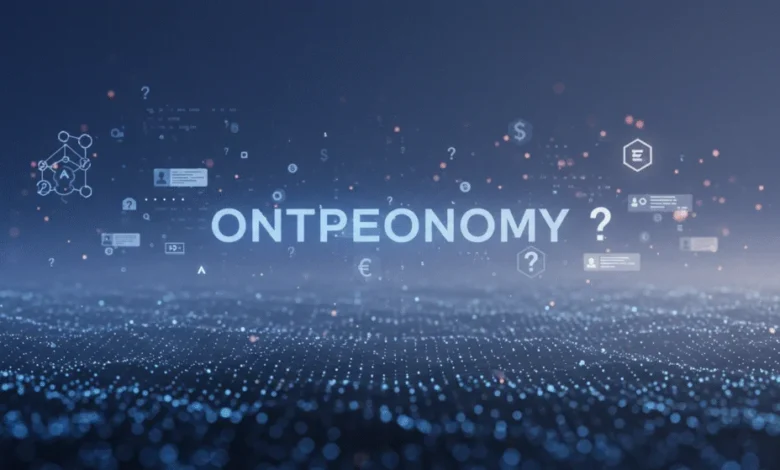Ontpeconomy: The Future of Digital Economic Growth

Introduction
Ontpeconomy is rapidly becoming a cornerstone concept in the digital economy, reshaping how businesses, individuals, and entire industries interact within decentralized systems. By merging blockchain technology, digital identity, and smart contracts, Ontpeconomy empowers participants to engage in secure, transparent, and efficient transactions. This innovative ecosystem creates opportunities for growth, trust, and scalability while eliminating inefficiencies that plague traditional financial systems. As industries move toward digitization, Ontpeconomy provides the infrastructure necessary to sustain long-term economic progress.
What is Ontpeconomy?
Ontpeconomy refers to the economic ecosystem built around the Ontology blockchain, where trust, identity, and data sovereignty drive value creation. Unlike centralized financial models, Ontpeconomy ensures that users maintain control over their data and interactions, fostering a self-sustaining and trust-driven market. At its core, Ontpeconomy leverages blockchain to create a seamless environment for digital commerce, enabling peer-to-peer transactions, decentralized finance (DeFi), and enterprise-level applications. The foundation of Ontpeconomy lies in its ability to integrate identity verification, tokenized assets, and smart contracts into a single interoperable system. This not only reduces costs but also unlocks entirely new business models that were not possible in traditional economies.
The Building Blocks of Ontpeconomy
Ontpeconomy thrives on several core pillars that together shape its efficiency and resilience:
1. Digital Identity: Identity lies at the heart of Ontpeconomy. Unlike conventional models where centralized authorities control data, Ontpeconomy allows users to own and verify their identities across different platforms. This empowers individuals with control while businesses gain verified, reliable information.
2. Tokenization: By converting assets into digital tokens, Ontpeconomy makes ownership transferable, divisible, and transparent. Tokenization allows real estate, intellectual property, and even supply chain assets to be traded seamlessly.
3. Smart Contracts: Smart contracts in Ontpeconomy ensure that agreements execute automatically once predefined conditions are met. This eliminates intermediaries, reduces costs, and boosts trust among participants.
4. Interoperability: Unlike isolated blockchains, Ontpeconomy emphasizes interoperability, allowing assets and data to move smoothly across ecosystems. This flexibility ensures adoption across industries.
5. Governance: Ontpeconomy employs a community-driven governance model, where stakeholders influence decisions and upgrades, ensuring fairness and long-term sustainability.
Why Ontpeconomy Matters in Today’s World
The global economy is undergoing a digital transformation, and traditional systems are struggling to keep up. Ontpeconomy addresses several pressing issues:
-
Trust Deficit: In centralized systems, users must rely on intermediaries. Ontpeconomy solves this with decentralized trust.
-
Data Ownership: Consumers demand control over personal data. Ontpeconomy provides verifiable digital identities and user sovereignty.
-
Efficiency Gaps: Manual processes and bureaucracy slow global trade. Ontpeconomy streamlines them through automation and smart contracts.
-
Accessibility: Ontpeconomy reduces entry barriers, giving individuals and small enterprises access to global markets once reserved for large corporations.
Ontpeconomy in Finance
One of the most transformative areas for Ontpeconomy is decentralized finance (DeFi). Through Ontpeconomy, users can borrow, lend, stake, and trade assets without traditional banks. The transparency of blockchain ensures fair terms, while tokenization unlocks liquidity from previously illiquid assets. Moreover, Ontpeconomy integrates identity verification into DeFi, reducing risks of fraud and ensuring compliance with global standards. This balance between decentralization and regulation makes Ontpeconomy a reliable alternative to legacy finance.
Ontpeconomy and Business Innovation
Enterprises are leveraging Ontpeconomy to improve supply chains, digital commerce, and intellectual property management. Tokenized supply chain assets provide real-time transparency, reducing fraud and inefficiency. Digital rights management ensures that creators are compensated fairly for their work, thanks to immutable smart contracts. Businesses also benefit from reduced operational costs, as Ontpeconomy removes layers of intermediaries and paperwork. For startups, Ontpeconomy lowers barriers to entry by offering trust, identity solutions, and access to decentralized funding models.
Ontpeconomy and Data Sovereignty
Data is the new oil, and Ontpeconomy ensures that it is not exploited unfairly. With verifiable credentials and decentralized identifiers, Ontpeconomy allows individuals to decide who accesses their data, for how long, and under what conditions. This user-centric approach stands in stark contrast to centralized platforms that monetize personal data without consent. Enterprises benefit as well, gaining access to reliable, user-permissioned data for analytics and innovation. This balance between privacy and utility is one of the most defining features of Ontpeconomy.
Ontpeconomy and Global Trade
Cross-border trade is often slowed by legal barriers, currency exchanges, and trust issues. Ontpeconomy removes these inefficiencies by creating a trustless system where contracts are enforced digitally and assets can be exchanged without delays. Digital identities streamline compliance with regulations, while tokenized currencies and assets reduce exchange friction. Ontpeconomy provides the foundation for a truly global digital economy, where participation is not limited by geography or bureaucracy.
Benefits of Ontpeconomy
Ontpeconomy provides clear advantages:
-
Transparency: Immutable blockchain records build trust.
-
Cost Efficiency: Reduced reliance on intermediaries lowers transaction costs.
-
Security: Advanced cryptography protects assets and identities.
-
Scalability: Ontpeconomy supports enterprise-level adoption and growth.
-
Inclusivity: From individuals to corporations, everyone can participate.
Challenges Facing Ontpeconomy
Despite its potential, Ontpeconomy must overcome several challenges:
-
Regulatory Uncertainty: Global regulations vary and evolve rapidly.
-
User Education: Mass adoption requires better understanding of blockchain technology.
-
Scalability Limits: As more participants join, technical scalability must keep pace.
-
Market Volatility: Tokenized assets can experience fluctuations in value.
These challenges are not unique to Ontpeconomy but apply across the blockchain sector. However, Ontpeconomy’s focus on identity and governance provides it with a strong foundation for long-term resilience.
Real-World Use Cases of Ontpeconomy
Ontpeconomy is not just theoretical; it is already reshaping industries:
-
Healthcare: Patients can control their medical data, granting access only to trusted providers.
-
Education: Academic credentials can be issued and verified digitally through Ontpeconomy.
-
E-Commerce: Sellers and buyers interact securely without fraudulent intermediaries.
-
Supply Chain: Goods are tracked from origin to destination, ensuring authenticity.
-
Creative Industries: Artists tokenize their work and receive royalties automatically.
The Future of Ontpeconomy
Looking ahead, Ontpeconomy will likely become the backbone of the decentralized digital economy. As adoption grows, industries will rely on Ontpeconomy for identity verification, data sovereignty, and global commerce. The integration of artificial intelligence and machine learning with Ontpeconomy could enhance predictive analytics and decision-making, creating even smarter digital ecosystems. With scalable infrastructure and a community-driven governance model, Ontpeconomy is positioned to thrive as a leading force in economic transformation.

FAQs about Ontpeconomy
What does Ontpeconomy mean? Ontpeconomy refers to the economic system built on the Ontology blockchain, integrating digital identity, smart contracts, and tokenized assets.
How does Ontpeconomy differ from other blockchain economies? Ontpeconomy prioritizes digital identity and interoperability, enabling secure and trust-driven transactions across industries.
Is Ontpeconomy only for businesses? No, Ontpeconomy benefits both individuals and enterprises by providing tools for identity, data control, and decentralized finance.
What industries can adopt Ontpeconomy? Healthcare, education, e-commerce, supply chain, and creative sectors are already exploring Ontpeconomy applications.
Is Ontpeconomy secure? Yes, Ontpeconomy uses advanced cryptography, immutable records, and smart contracts to ensure high levels of security.
Can Ontpeconomy replace traditional banks? While not a full replacement, Ontpeconomy offers decentralized finance alternatives that reduce reliance on traditional banking.
What are the risks of Ontpeconomy? Regulatory uncertainty, scalability limits, and market volatility are current challenges, but innovation is steadily addressing them.
Conclusion
Ontpeconomy is more than a blockchain economy; it is a vision of how trust, identity, and data sovereignty can redefine global commerce. By combining transparency, efficiency, and inclusivity, Ontpeconomy sets the stage for a new digital era. Despite challenges, its long-term potential is undeniable, and as adoption spreads across industries, Ontpeconomy will continue to lead the way in shaping the future of digital economies.




